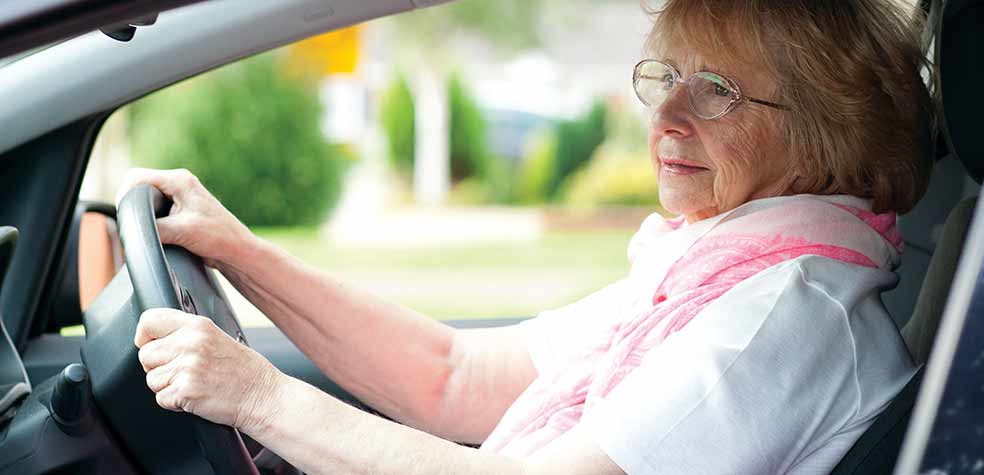Worried about someone's driving?

It can be difficult to broach the subject of a person’s driving with someone you care about, but if you feel that they’ve become a danger to themselves and to others on the roads, then it’s important that you find a way to talk to them about it.
Is there an upper age limit for driving in the UK?
There’s no set age when a person must legally stop driving. They can continue to drive into their later years as long as they can do so safely and don’t have any medical conditions that affect their driving.
However, when a person turns 70 they will need to renew their driving licence with the Driver Vehicle Licence Agency (DVLA). After that, renewal is required every 3 years.
What can affect an older person’s ability to drive?
Some health issues can affect an older person’s reaction time, reflexes and other aspects of driving, such as:
- Medication: some medications can slow down reaction time or cause sleepiness.
- Eyesight or vision problems: poor eyesight can affect the ability to see clearly front-on or from the sides.
- Hearing loss: they may not be able to hear a car horn or siren.
- Mobility problems or pain: they may have difficulty or be slower pulling the handbrake, using the footbrake or moving their heads to check their side vision.
- Memory problems: they may get lost, confused or disorientated if they are in an unfamiliar area.
If the change in someone’s driving ability is linked to a health condition, there could be a solution that would allow them to continue driving safely. Encourage the person to speak to their GP or pharmacist about any health problems or medications that may be affecting their ability to drive safely.
Where can someone get help and support with their driving?
Mobility centres offer high quality information, advice and assessments regarding mobility and driving. They have trained staff who can assess a person’s driving and look at what could help them to stay driving for longer. The aim of mobility centres is to help older drivers continue driving as long as they can do so safely.
A driver can be referred to a mobility centre by their GP or healthcare professional. Someone may be referred because they have a health condition or disability.
Some centres allow self-referral. This could be for those who feel that their skills need to be updated or they need to be sure that they’re still safe to drive. There may be a charge for self-referral.
Once the centre has assessed a person’s driving, they’ll give advice on what to do next. That may be simply saying someone is still safe to drive or they may suggest a period of retraining to update skills and gain more confidence.
How can I talk to an older person about not driving?
Ultimately it’s the older person’s decision (or the DVLA’s) to stop driving. But if you feel that their driving ability is affecting their safety, or they’re putting other people in danger, then you have a responsibility talk to them about it.
It may help you to discuss the issue with them if you put yourself in their shoes and think about what the impact would be on your day-to-day life if you had to give up driving.
You may find it useful to do some research beforehand so that you can offer some solutions to help the person remain independent and keep doing the things they enjoy, for example visiting friends or going shopping. Find out about:
- public or community transport options available and whether the person would be eligible for any concessions
- assistive aids or car adaptations that make driving easier – such as power steering, special cushions, hand controls, etc. Contact Driving Mobility for advice
- experienced Driver Assessments which provide a comprehensive report on a person’s driving ability and offers suggestions for improvement. The Royal Society for the Prevention of Accidents (RoSPA) offer these.
Approach the subject sensitively and tactfully. It may be difficult if the person reacts defensively, gets upset or feels humiliated. Remain supportive and positive. If the conversation is becoming particularly difficult or upsetting, you may want to break off the conversation and revisit it another time.
Encourage the person to think about whether they’re putting themselves and others at risk which might help them consider whether their driving is a concern.
They might be grateful that you’ve broached the topic with them, and find comfort knowing that they have support to find a way forward.
If the person agrees to stop driving, be conscious that it can be difficult for them to accept and adjust to life without a car. Find ways to help them through this transition as they may feel a sense of loss and have practical issues regarding getting around now they’re no longer driving.
In the driving seat
Read about more alternatives to driving
What happens if someone refuses to stop driving?
If you are seriously concerned about an older person’s driving then you can inform the DVLA. Think carefully about how this would affect your relationship with the person and whether there is another way for you to get them to think about giving up.
Age NI Advice Service
Every year our Advice Service deals with thousands of calls from older people in need. Call us today to make sure that you are receiving all the help and support available to you.
